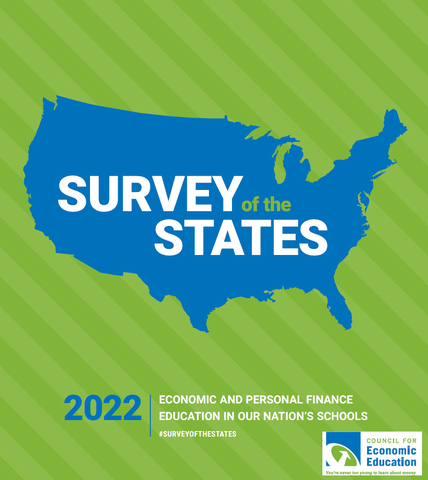New FinEd50 Initiative from Visa & CEE Aims to Accelerate Financial Education Requirements for All Students
Despite advances in ensuring access to personal finance classes in K-12 schools, there’s troubling stagnation in equally important economics education, according to the 2022 Survey of the States: Economic and Personal Finance Education in Our Nation’s Schools by the Council for Economic Education (CEE).
This press release features multimedia. View the full release here: https://www.businesswire.com/news/home/20220317005101/en/

We fail our children when states don’t require study in life-essential economic & personal finance concepts, says the Council for Economic Education's 2022 Survey of the States: Economic and Personal Finance Education in Our Nation's Schools. While CEE finds encouraging progress in access to personal finance classes, there’s troubling stagnation in equally important K-12 economics education. State-by-state details at www.surveyofthestates.com. (Graphic: Business Wire)
“America is failing our children when we don’t provide them with opportunities to study critical economic and personal finance concepts before they leave high school for college, for jobs and for their futures,” said Nan J. Morrison, CEE president and chief executive officer. “While we’re encouraged by some progress in our latest Survey, all young people across the country need more and deserve better.”
Only 25 states require students to take a course in economics to graduate high school, the 2022 Survey found -- a standstill from 2020’s Survey and an increase of only three states in the last decade. And several states, including Georgia and South Carolina, are considering removing economics from graduation requirements.
Parallel requirements for personal finance are on an encouraging upward path, the Survey found. States mandating that for graduation grew to 23, up by two – Nebraska and New Mexico – since 2020. Ohio and Mississippi updated their requirements to a standalone personal finance course. And the Florida legislature just this month unanimously sent to Gov. Ron DeSantis a bill that would make it the most populous state to require personal finance for graduation.
As noted in the Survey, “Absent exposure to both subjects, America’s young people are denied full access to the knowledge they need to successfully navigate their lives as both individuals and as members of larger and increasingly complex communities and societies.”
Adds Morrison, “Short-changing universal access hits particularly hard on historically underserved students and students of color. When requirements and funding vary among districts, the disparate quality and effectiveness of financial education create and extend inequities. Intentional statewide approaches help move the equity needle for all.”
With data showing millions of students left in the dark on money matters, Visa (NYSE: V), which helped fund this year’s Survey, and CEE are launching FinEd50, a coalition of private, public and nonprofit leaders that will promote guaranteed access everywhere to these essential courses. FinEd50 members also will provide additional training and curriculum support to teachers and school districts.
“The state of financial education offered to students in the U.S. varies significantly. Where students live should not impact whether they have access to knowledge that will help them learn how to make informed financial decisions in their lives,” said Worku Gachou, head of North America, inclusive impact & sustainability, at Visa. “Visa is proud to be a cofounding partner of FinEd50 and we welcome all who are passionate about ensuring young people have access to financial education to join us.”
Since 1998, CEE has collected and analyzed data from all 50 states and the District of Columbia, making the biennial Survey of the States an important benchmark for tracking progress on economic and personal financial education.
The full 2022 Survey report with detailed tables and methodology is available at SurveyOfTheStates.com. Additional information on the coalition is at FinEd50.com. And join the conversation at #SURVEYOFTHESTATES.
About the Council for Economic Education:
CEE’s mission is to teach K-12 students about economics and personal finance so they can make better decisions for themselves, their families and their communities. We carry out our mission by providing resources and training to K-12 educators and have done so for over 70 years. Nearly two-thirds of the tens of thousands of teachers we reach virtually and in-person are in low to moderate income schools. All resources and programs are developed by educators and delivered by our 200 affiliates across the country in every state. Through our student-facing programs, including Invest in Girls, the National Personal Finance Challenge and the National Economics Challenge, CEE continues to inform, motivate and inspire young minds across the country. Find out more at councilforeconed.org and on Twitter, Facebook and LinkedIn.
View source version on businesswire.com: https://www.businesswire.com/news/home/20220317005101/en/
The Survey says! Check your state's rules on high school #personalfinance & #economics classes. New #SurveyOfTheStates from @CouncilEconEd finds only 23 states require a semester of personal finance to graduate. Who’s losing out? www.surveyofthestates.com
Contacts
Media information or to arrange interviews:
Kate Alexander: kate@successioncommunications.com | 201-638-3946
Steve Hirsh: steve@successioncommunications.com | 202-441-1516





